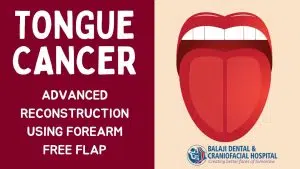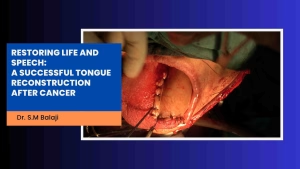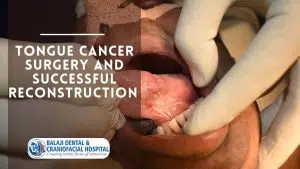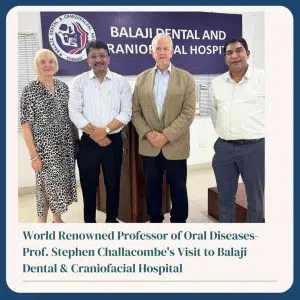Tongue cancer surgery in India has seen remarkable advancements in recent years, offering patients world-class treatment and functional recovery. .This case highlights a 36- year-old male diagnosed with well differentiated squamous cell carcinoma involving the right lateral border of the tongue., who underwent successful hemiglossectomy and tongue reconstruction at Balaji Dental and Craniofacial Hospital, Chennai—a leading center for oral cancer surgery in India.
Patient Presentation: Early Warning Signs of Tongue Cancer
The patient arrived with a large ulcerating growth on the side of his tongue, accompanied by symptoms commonly associated with tongue cancer:
Persistent tongue ulcer
Burning sensation
Pain while chewing
Difficulty in eating
A biopsy confirmed well-differentiated squamous cell carcinoma, one of the most common oral cancers in India.
Comprehensive Diagnosis Before Tongue Cancer Surgery
Before planning surgery, the patient underwent:
MRI Scan
Whole-body PET-CT
Full laboratory evaluation
These advanced imaging techniques help determine the extent of tongue cancer, a crucial step in planning tongue cancer treatment in India.
The multidisciplinary tumour board recommended:
PEG tube placement for nutritional support
Hemiglossectomy
Right selective neck dissection (Levels I–IV)
Tongue reconstruction using a radial forearm free flap
Expert Surgical Planning by Leading Oral Cancer Surgeon in India
The surgery was performed under the guidance of Dr. SM Balaji, a renowned oral cancer and craniomaxillofacial surgeon in India with over 30 years of experience. His expertise in microvascular reconstruction ensures excellent functional outcomes for tongue cancer patients.
Tongue Cancer Surgery Procedure
The surgical team began with a wide mucosal incision covering the full tumour region, ensuring adequate cancer-free margins.
A selective neck dissection was performed, and frozen section reports confirmed negative margins, allowing the reconstructive phase to proceed.
Reconstruction with Radial Forearm Free Flap
A radial artery forearm free flap is considered one of the best reconstruction methods for tongue cancer because of its:
Thin, flexible tissue
Reliable blood supply
Natural mobility
Microvascular anastomosis included:
Radial artery → Superior thyroid artery
Cephalic vein → Common facial vein
A successful pinprick test confirmed excellent flap vascularity.
Postoperative Results & Future Rehabilitation
The patient achieved excellent postoperative healing, speech preservation, and early functional recovery—key goals of tongue reconstruction surgery in India.
He will undergo a subsequent mandibular reconstruction as part of his full rehabilitation plan.






